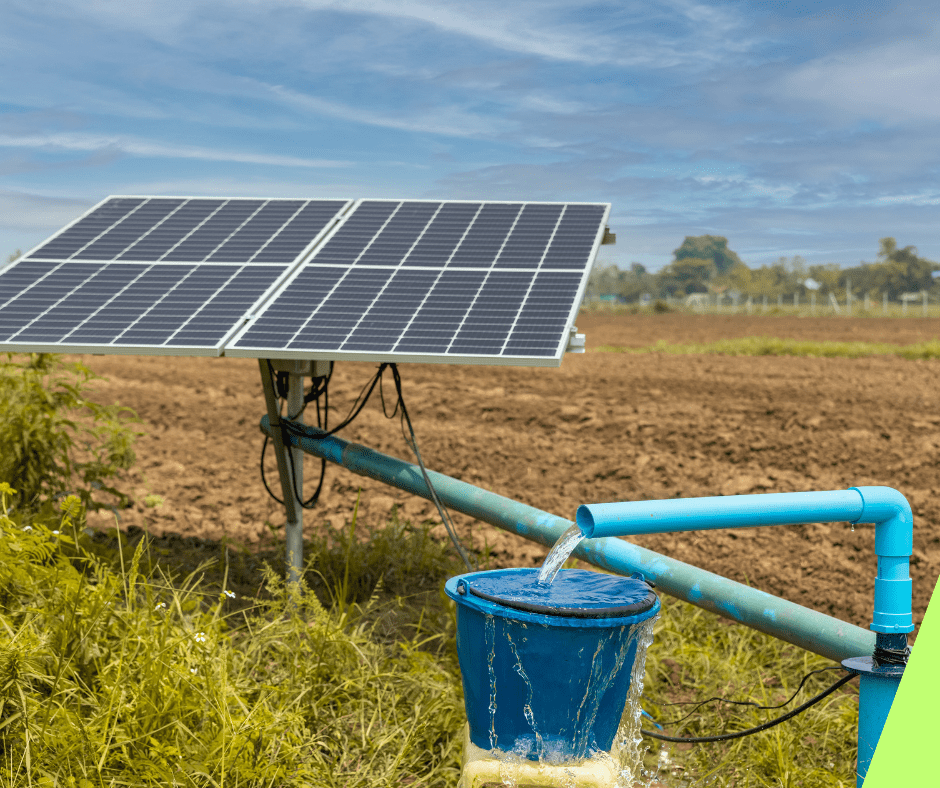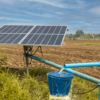A solar water pump is a water pumping system powered by electricity generated from solar panels. Designed for sustainability, these pumps use energy from the sun, offering an eco-friendly solution for water supply needs.
How Do Solar Water Pumps Work?
Solar water pumps operate on the photovoltaic (PV) principle. Solar panels capture sunlight and convert it into electrical energy. A controller regulates the power flow from the panels to the pump, ensuring optimal operation. For consistent performance on cloudy days or at night, solar batteries can be installed to store energy for later use.
Components of a Solar Water Pump System
A solar water pump system typically consists of:
1. Solar Panel – Converts sunlight into electricity.
2. Controller – Manages power flow between components.
3. Inverter – Converts DC power from panels to AC for AC pumps.
4. Battery – Stores energy for use during cloudy periods or at night.
5. Pump – Converts electrical energy into kinetic energy to move water.
6. Storage Tank – Holds pumped water for later use.
Types of Solar Water Pumps
Solar water pumps are categorized based on their application and operation:
1. Submersible Solar Pumps
– Designed for underwater operation.
– Ideal for deep wells, boreholes, and large water sources.
– Can lift water up to 650 feet, making them suitable for irrigation, livestock watering, and aeration.
2. Surface Solar Pumps
– Operate above the water level.
– Suitable for shallow wells, ponds, rivers, or storage tanks.
– Effective for lifting water from depths of up to 20 meters.
3. DC Solar Pumps
– Powered directly by DC current from solar panels.
– Do not require an inverter.
– Best for small-scale or remote applications.
4. AC Solar Pumps
– Operate using AC current, requiring an inverter.
– Suitable for large-scale irrigation and community water projects.
Advantages of Solar Water Pumps
1. Cost-Effective – Lower operating costs compared to fuel-powered pumps.
2. Eco-Friendly – Reduces carbon emissions and promotes sustainable energy use.
3. Off-Grid Operation – Ideal for remote areas without grid electricity.
4. Minimal Running Costs – Solar energy is free and abundant.
Disadvantages of Solar Water Pumps
1. High Initial Costs – Installation can be expensive.
2. Weather Dependency – Performance may decline during cloudy days or at night without batteries.
3. Maintenance Requirements – Regular upkeep is necessary for efficient performance.
4. Energy Storage Needs – Batteries are essential for uninterrupted operation in low sunlight conditions.
Applications of Solar Water Pumps

Solar water pumps have versatile applications, including:
– Irrigating agricultural land.
– Providing water for livestock.
– Supplying water for daily use in remote areas.
– Powering fountains, waterfalls, and other garden features.
Conclusion
Solar water pumps are an economical, eco-friendly, and versatile solution for water supply needs. By utilizing renewable solar energy, they offer an ideal alternative to traditional electricity or diesel-powered systems. If you’re in the market for a reliable solar water pump, Sulu provides a wide range of options to suit your needs.





